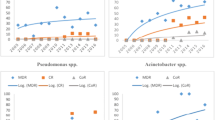Abstract
Goals of work
Febrile neutropenia (FN) causes considerable morbidity in patients on cytotoxic chemotherapy. Recently, there has been a trend towards fewer Gram-negative and more Gram-positive infections with increasing antibiotic resistance. To assess these patterns, data from a supra-regional cancer centre in Ireland were reviewed.
Patients and methods
A 5-year review of all positive blood cultures in patients undergoing anti-cancer chemotherapy was carried out.
Main results
Eight hundred and ninety-four patients were reviewed. The mean incidence of FN was 64.2 cases per year. Eight hundred and forty-six blood culture specimens were taken and 173 (20.4%) were culture positive. The isolated organisms were Gram positive (71.1%), Gram negative (27.8%) and fungal (1.1%). Of the Gram-positive organisms, 75.6% were staphylococci. Of these, 67.8% were coagulase-negative staphylococci and 30.1% were Staphylococci aureus. Amongst the S. aureus, 89.3% were methicillin-resistant (MRSA). Vancomycin-resistant enterococci were not identified as a cause of positive blood cultures.
Conclusions
Amongst patients with cancer who develop FN in our hospital, Gram-positive bacteria account for the largest proportion. The high proportion of MRSA as a cause of positive blood cultures is of concern.
Similar content being viewed by others
Abbreviations
- FN:
-
febrile neutropenia
- MRSA:
-
methicillin-resistant Staphylococcus aureus
- VRE:
-
vancomycin-resistant enterococci
- CSFs:
-
colony-stimulating factors
- S. aureus :
-
Staphylococcus aureus
References
Sipsas NV, Bodey GP, Kontoyiannis DP (2005) Perspectives for the management of febrile neutropenic patients with cancer in the 21st century. Cancer 103:1103–1113
Rolston KV (2005) Challenges in the treatment of infections caused by Gram-positive and Gram-negative bacteria in patients with cancer and neutropenia. Clin Infect Dis 40:S246–S252
Klastersky J, Aoun M (2004) Opportunistic infections in patients with cancer. Ann Oncol 15:329–335
Smith PF, Birmingham MC, Noskin GA et al (2003) Safety, efficacy and pharmacokinetics of linezolid for treatment of resistant Gram-positive infections in cancer patients with neutropenia. Ann Oncol 14:795–801
Elting LS, Rubenstein EB, Rolston K et al (2000) Time to clinical response: an outcome of antibiotic therapy of febrile neutropenia with implications for quality and cost of care. J Clin Oncol 18:3699–3706
Gonzalez-Barca E, Fernandez-Sevilla A, Carratala J et al (1996) Prospective study of 288 episodes of bacteremia in neutropenic cancer patients in a single institution. Eur J Clin Microbiol Infect Dis 15:291–296
Tomiak AT, Yau JC, Huan SD et al (1994) Duration of intravenous antibiotics for patients with neutropenic fever. Ann Oncol 5:441–445
Mathur P, Chaudhry R, Kumar L et al (2002) A study of bacteremia in febrile neutropenic patients at a tertiary-care hospital with special reference to anaerobes. Med Oncol 19:267–272
Pizzo PA (1993) Management of fever in patients with cancer and treatment-induced neutropenia. N Engl J Med 328:1323–1332
McDonald P, Mitchell E, Johnson H et al (2003) Epidemiology of MRSA: the North/South study of MRSA in Ireland 1999. J Hosp Infect 54:130–134
MacKenzie FM, Bruce J, Struelens MJ et al (2007) ARPAC Steering Group. Antimicrobial drug use and infection control practices associated with the prevalence of methicillin-resistant Staphylococcus aureus in European hospitals. Clin Microbiol Infect 13:269–276
Reynolds R, Potz N, Colman M et al (2004) BSAC extended working party on bacteraemia resistance surveillance. Antimicrobial susceptibility of the pathogens of bacteraemia in the UK and Ireland 2001–2002: the BSAC Bacteraemia Resistance Surveillance Programme. J Antimicrob Chemother 53:1018–1032
Irish European Antimicrobial Resistance Surveillance System Steering Group (EARSS) EARSS Report for Quarter 1 2007 (Ireland). Health Services Executive, Health Protection Surveillance Centre, Dublin, http://www.ndsc.ie/hpsc/A-Z/MicrobiologyAntimicrobialResistance/EuropeanAntimicrobialResistanceSurveillanceSystemEARSS/EARSSSurveillanceReports/2007Reports/
Smith TJ, Khatcheressian J, Lyman GH et al (2006) 2006 update of recommendations for the use of white blood cell growth factors: an evidence-based clinical practice guideline. J Clin Oncol 24:3187–3205
Aapro MS, Cameron DA, Pettengell R et al (2006) EORTC guidelines for the use of granulocyte-colony stimulating factor to reduce the incidence of chemotherapy-induced febrile neutropenia in adult patients with lymphomas and solid tumours. Eur J Cancer 42:2433–2453
National Cancer Institute (2003) Common terminology criteria for adverse events v3.0 (CTCAE). National Cancer Institute, Bethesda, www.cancer.gov
Pizzo PA, Ladisch S, Simon RM et al (1978) Increasing incidence of Gram-positive sepsis in cancer patients. Med Pediatr Oncol 5:241–244
Paul M, Borok S, Fraser A et al (2005) Additional anti-Gram-positive antibiotic treatment for febrile neutropenic cancer patients. Cochrane Database Syst Rev (3) Art. No.: CD003914. DOI 10.1002/14651858.CD003914.pub2
Gopal AK, Fowler VG Jr, Shah M et al (2000) Prospective analysis of Staphylococcus aureus bacteremia in nonneutropenic adults with malignancy. J Clin Oncol 18:1110–1115
Figuera Esparza M, Carballo M, Silva M et al (2006) Microbiological isolates in patients with febrile neutropenia and hematological neoplasias. Rev Esp Quimioter 19:247–251
Paul M, Yahav D, Fraser A, Leibovici L (2006) Empirical antibiotic monotherapy for febrile neutropenia: systematic review and meta-analysis of randomized controlled trials. J Antimicrob Chemother 57:176–189
Paul M, Borok S, Fraser A et al (2005) Empirical antibiotics against Gram-positive infections for febrile neutropenia: systematic review and meta-analysis of randomized controlled trials. J Antimicrob Chemother 55:436–444
Acknowledgements
The authors would like to thank Maurice Mallen for his assistance in reviewing the laboratory data.
Author information
Authors and Affiliations
Corresponding author
Additional information
The Cancer Centre Beaumont hospital is affiliated to National Surgical Adjuvant Breast and Bowel Project, Eastern Co-operative Oncology Group and All Ireland Co-operative Oncology Research Group and Health Research Board.
Rights and permissions
About this article
Cite this article
Morris, P.G., Hassan, T., McNamara, M. et al. Emergence of MRSA in positive blood cultures from patients with febrile neutropenia—a cause for concern. Support Care Cancer 16, 1085–1088 (2008). https://doi.org/10.1007/s00520-007-0398-5
Received:
Accepted:
Published:
Issue Date:
DOI: https://doi.org/10.1007/s00520-007-0398-5




